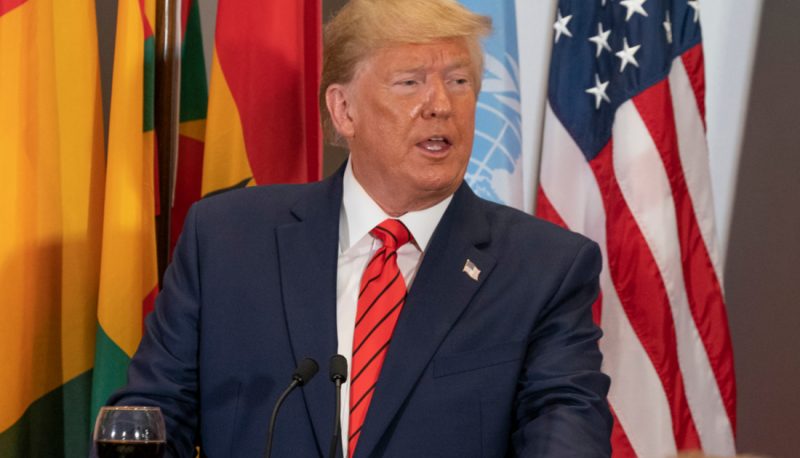“Confirmed Judges, Confirmed Fears” is a blog series documenting the harmful impact of President Trump’s judges on Americans’ rights and liberties. Cases in the series can be found by issue and by judge at this link.
Trump Fourth Circuit Judges Julius Richardson, Marvin Quattlebaum, and Allison Rushing joined dissents arguing that the court should have dismissed a lawsuit against Trump contending that he has violated the Constitution’s Emoluments Clauses by continuing to accept foreign and state money and profit from his D.C. luxury hotel while president. By a 9-6 vote, the full Fourth Circuit rejected Trump’s claims and allowed the case to go forward in its May 2020 opinions in In re:Trump and D.C. v. Trump.
In 2018, the governments of D.C. and Maryland filed suit in federal court, contending that Trump is violating the Constitution’s Emoluments Clauses by accepting payments connected with his private businesses from foreign and U.S. state governments. The district court narrowed the suit to focus only on payments related to Trump’s luxury hotel in D.C. and allowed that part of the case to go forward. Trump then filed an immediate appeal even though there had not even been discovery in the case, and also petitioned the Fourth Circuit for a writ of mandamus, asking that it either allow the immediate appeal or dismiss the case altogether. A three-judge panel agreed to do the latter, but the full Fourth Circuit decided to vacate the panel ruling and reconsider the case.
The court issued two opinions, both written by Judge Diana Gribbon Motz and joined by eight other judges, including Chief Judge Roger Gregory, who received a recess appointment from President Clinton and was then nominated for a permanent seat by President George W. Bush. Motz explained that the court was according Trump “great deference as head of the Executive branch,” but that Congress and the Supreme Court have “severely limited” its ability to grant the “extraordinary relief” being sought, and concluded that Trump “has not established a right” to such relief.
One opinion dealt with Trump’s effort to have the appellate court immediately grant him immunity from being sued, even though the district court had not yet ruled on that issue. The six dissenters, including Trump judges Richardson, Rushing, and Quattlebaum, argued that the district court was improperly delaying its ruling and, based on prior cases, the Fourth Circuit should immediately review the issue and grant Trump immunity. But as the majority explained, a lower court had ruled on immunity claims in the cases cited by the dissenters, who could find not a “single case” where an appellate court decided it had jurisdiction of an appeal where the lower court had not yet ruled on the issue.
The majority also criticized the dissent for its accusations that the lower court had been “deliberately dilatory.” The majority carefully showed that the district court was proceeding properly and had promised to rule expeditiously on the immunity claim, and concluded that there was no proper basis for the dissenters’ “troubling and unwarranted attack” on the district court, which not even Trump’s own lawyers had done on appeal.
The court’s other opinion dealt with Trump’s request for a writ of mandamus directing the lower court either to allow an appeal or dismiss the case entirely, and thus stop any pretrial discovery. Based on binding precedent, Judge Motz explained that Trump would have to show an “indisputable” right to shut down the suit in order for the appellate court to intervene at this stage. After a thorough review of the facts and the law, she concluded that Trump simply had not done so. In addition, she pointed out, the discovery being sought by D.C. and Maryland simply concerned business records of hotel stays and expenses from “third parties and low-level government employees.” Such discovery, she went on, “implicates no Executive power,” and Trump had not shown how that discovery “pertaining to spending at a private restaurant and hotel threaten[s] any Executive Branch prerogative.”
The dissent nonetheless argued that the discovery and the entire lawsuit were disruptive and improper, and accused the majority of inviting judges “to assemble along partisan lines” and become “partisan warriors.” These assertions were firmly rejected by the majority, which explained that its “narrow holding, reached with careful attention to the standard of review, is the essence of restraint.” Judge Motz drily suggested that readers “compare our measured approach with the dramatics of the dissent and draw their own conclusions.”
In a concurring opinion, Judge James Wynn was even more direct. He made clear that it was the dissenters who were making a “naked policy choice” to try to defend Trump despite the majority’s “painstaking adherence to settled law” in deciding that Trump simply had not shown “entitlement to a writ of mandamus.”
Trump’s lawyers have already stated that they will seek to suspend the decision until the Supreme Court can review it, and will make such a request directly to the Supreme Court if necessary. All the judges nominated by Trump to the Fourth Circuit did in fact make the “naked policy choice” to try to defend him, and with two more Trump nominees on the Supreme Court, there is ample reason for concern about what the Court will do in this important case.

